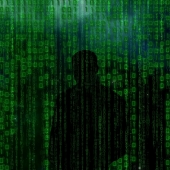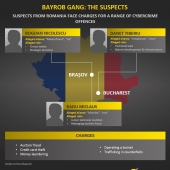-
Wall Street IT Engineer Hacks Employer to See If He Will Be Let Go
On Friday, April 7, the FBI arrested Zhengquan Zhang, a 31-year-old IT engineer, who now stands accused of installing malware on his employer's servers to steal proprietary source.
- April 23, 2017
- 07:45 AM
 1
1
-
Crooks Founded Two ISPs to Hide Illegal TV Streaming Platform
A group of criminals went as far as to register and manage two Internet Service Providers in two different countries in order to manage an illegal TV streaming platform that offered IPTV (IP Television) service to customers all over the world.
- April 06, 2017
- 10:00 AM
 0
0
-
AlphaBay Adds Support for Ethereum as Transaction Volume Surpasses Bitcoin
The Internet's largest Dark Web marketplace AlphaBay announced upcoming support for Ethereum, the cryptocurrency that recently is giving Bitcoin a running for today's most popular digital currency.
- March 20, 2017
- 06:00 AM
 2
2
-
The Dark Web Has Shrunk by 85%
The number of Dark web services has gone down significantly following the Freedom Hosting II hack that took place at the start of February, and is only around 4,400 services, according to a recently published OnionScan report.
- March 07, 2017
- 04:45 AM
 0
0
-
Revenge Hacks Cost Former Employee 34 Months in Prison, $1.1 Million in Damages
Brian P. Johnson, 44, of Baton Rouge, Louisiana, will have to spend the next 34 months in federal prison and pay $1,134,828 in damages after hacking his former employer shortly after being fired.
- February 17, 2017
- 11:46 AM
 0
0
-
XSender: The Source of All the Recent XMPP Spam
In recent months, security researchers, hackers, and other dwellers of the cyber-criminal underground have noticed an uptick in XMPP (formerly Jabber) spam.
- January 28, 2017
- 06:40 AM
 2
2
-
Events Behind July 2016 Taiwan ATM Heists Are Coming to Light
Taiwanese authorities sentenced three crooks they arrested last summer to five years in prison for their role in a massive ATM heist operation that involved a total of 22 individuals.
- January 27, 2017
- 10:10 AM
 0
0
-
Ripper.cc Helps Cyber Criminals Avoid Getting Scammed
Crooks lurking around the Internet's underbelly have created a service called Ripper.cc, a database of known and proven fraudsters.
- January 25, 2017
- 05:10 PM
 0
0
-
Los Angeles Valley College Pays a Whopping $30,000 in Ransomware Incident
The Los Angeles Community College District (LACCD) agreed to pay a ransom demand of $28,000 to crooks who managed to infect the computer network of the Los Angeles Valley College (LAVC) with ransomware.
- January 10, 2017
- 04:56 AM
 0
0
-
Another Misguided Teen Arrested for DDoSing High School Network
Police in Shelton, Connecticut have arrested a teenager for launching DDoS attacks on his/her former high school's network.
- December 30, 2016
- 07:00 PM
 11
11
-
Crook Who Used His Home IP Address for Banking Fraud Gets 5 Years in Prison
A UK judge sentenced a crook part of a cybercrime operation that used banking malware to five years in prison for stealing £840,000 ($1,035,000) from victims all over the world.
- December 21, 2016
- 04:05 AM
 2
2
-
Bayrob Malware Gang Had Elite Tactics, but They Still Got Caught Anyway
Romanian authorities have arrested and extradited to the US three nationals suspected of creating and distributing the Bayrob malware.
- December 16, 2016
- 06:26 PM
 0
0
-
Hackers Attacking Russia Will Face up to 10 Years in Prison According to New Bill
The Russian Parliament is working on a new law that would introduce criminal liability for hackers creating tools and participating in cyber-attacks against Russian infrastructure.
- December 08, 2016
- 06:00 AM
 1
1
-
Hackers Stole $31 Million from Russia's Central Bank
Unidentified hackers have stolen $31 million (₽2 billion) from customer accounts at Russia's Central Bank, but officials have managed to recover $26 million (₽1.66 billion) from the stolen funds, said the bank in a report released today.
- December 02, 2016
- 03:37 PM
 0
0
-
Dridex and Dyre Malware Gang Members Arrested in the UK
British authorities have arrested fourteen people across the country on suspicion of helping the cybercriminals behind the Dridex and Dyre malware launder ill-gotten funds.
- November 07, 2016
- 07:05 PM
 0
0





















